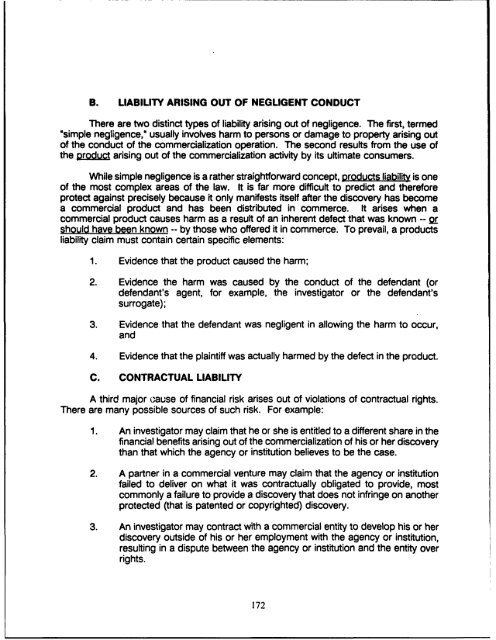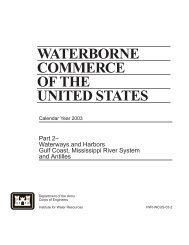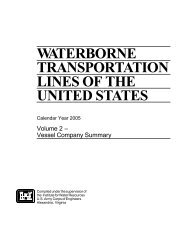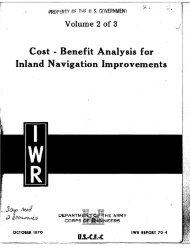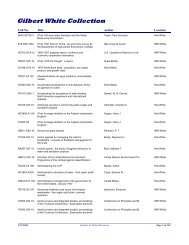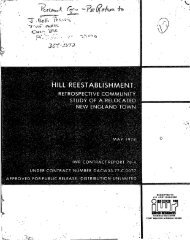Challenges and Opportunities for Innovation in the Public Works ...
Challenges and Opportunities for Innovation in the Public Works ...
Challenges and Opportunities for Innovation in the Public Works ...
You also want an ePaper? Increase the reach of your titles
YUMPU automatically turns print PDFs into web optimized ePapers that Google loves.
B. LIABILITY ARISING OUT OF NEGLIGENT CONDUCT<br />
There are two dist<strong>in</strong>ct types of liability aris<strong>in</strong>g out of negligence. The first, termed<br />
"simple negligence," usually <strong>in</strong>volves harm to persons or damage to property aris<strong>in</strong>g out<br />
of <strong>the</strong> conduct of <strong>the</strong> commercialization operation. The second results from <strong>the</strong> use of<br />
<strong>the</strong> p aris<strong>in</strong>g out of <strong>the</strong> commercialization activity by its ultimate consumers.<br />
While simple negligence is a ra<strong>the</strong>r straight<strong>for</strong>ward concept, products liability is one<br />
of <strong>the</strong> most complex areas of <strong>the</strong> law. It is far more difficult to predict <strong>and</strong> <strong>the</strong>re<strong>for</strong>e<br />
protect aga<strong>in</strong>st precisely because it only manifests itself after <strong>the</strong> discovery has become<br />
a commercial product <strong>and</strong> has been distributed <strong>in</strong> commerce. It arises when a<br />
commercial product causes harm as a result of an <strong>in</strong>herent defect that was known -- or<br />
should have been known -- by those who offered it <strong>in</strong> commerce. To prevail, a products<br />
liability claim must conta<strong>in</strong> certa<strong>in</strong> specific elements:<br />
1. Evidence that <strong>the</strong> product caused <strong>the</strong> harm;<br />
2. Evidence <strong>the</strong> harm was caused by <strong>the</strong> conduct of <strong>the</strong> defendant (or<br />
defendant's agent, <strong>for</strong> example, <strong>the</strong> <strong>in</strong>vestigator or <strong>the</strong> defendant's<br />
surrogate);<br />
3. Evidence that <strong>the</strong> defendant was negligent <strong>in</strong> allow<strong>in</strong>g <strong>the</strong> harm to occur,<br />
<strong>and</strong><br />
4. Evidence that <strong>the</strong> pla<strong>in</strong>tiff was actually harmed by <strong>the</strong> defect <strong>in</strong> <strong>the</strong> product.<br />
C. CONTRACTUAL LIABILITY<br />
A third major cause of f<strong>in</strong>ancial risk arises out of violations of contractual rights.<br />
There are many possible sources of such risk. For example:<br />
1. An <strong>in</strong>vestigator may claim that he or she is entitled to a different share <strong>in</strong> <strong>the</strong><br />
f<strong>in</strong>ancial benefits aris<strong>in</strong>g out of <strong>the</strong> commercialization of his or her discovery<br />
than that which <strong>the</strong> agency or <strong>in</strong>stitution believes to be <strong>the</strong> case.<br />
2. A partner <strong>in</strong> a commercial venture may claim that <strong>the</strong> agency or <strong>in</strong>stitution<br />
failed to deliver on what it was contractually obligated to provide, most<br />
commonly a failure to provide a discovery that does not <strong>in</strong>fr<strong>in</strong>ge on ano<strong>the</strong>r<br />
protected (that is patented or copyrighted) discovery.<br />
3. An <strong>in</strong>vestigator may contract with a commercial entity to develop his or her<br />
discovery outside of his or her employment with <strong>the</strong> agency or <strong>in</strong>stitution,<br />
result<strong>in</strong>g <strong>in</strong> a dispute between <strong>the</strong> agency or <strong>in</strong>stitution <strong>and</strong> <strong>the</strong> entity over<br />
rights.<br />
172


